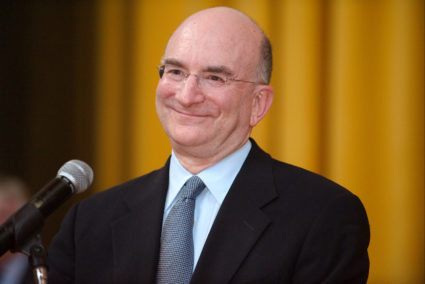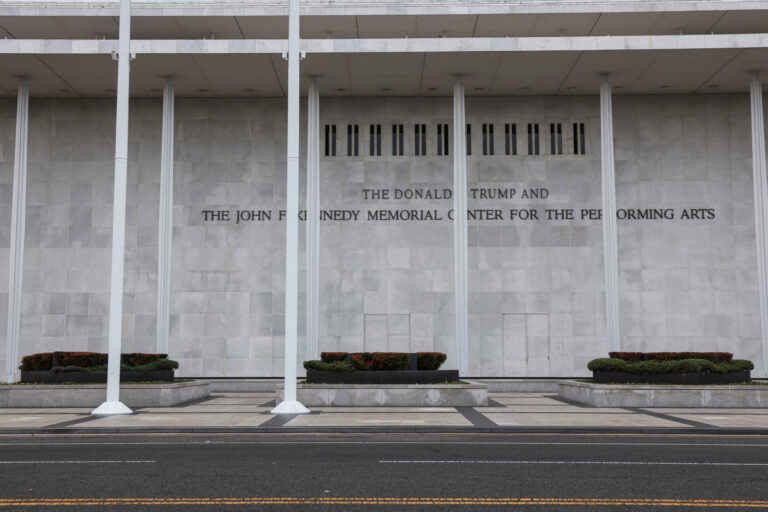
Alan Brinkley, scholar of liberalism, dies at age 70
NEW YORK (AP) — Alan Brinkley, an influential historian and academic who traced the evolution of liberalism from the New Deal to the 21st century and was a popular commentator on culture and politics, has died at age 70.
Brinkley died Sunday at his home in Manhattan. Daughter Elly Brinkley says he died of complications from a disease related to Lou Gehrig's disease, or ALS.
One of four children of network anchorman David Brinkley, Alan Brinkley grew up in a home where guests included John F. Kennedy and Arthur M. Schlesinger Jr., and politics, history and culture were all-day conversations. He became a National Book Award winner, Pulitzer Prize finalist and prominent author of two widely used American history textbooks. He also taught at Harvard University and Columbia University, which he joined in 1991. At Columbia, he served as University Provost from 2003-2009.
"Alan Brinkley: A Life in History," a tribute featuring contributions from critic-"Veep" producer Frank Rich, biographer A. Scott Berg and Pulitzer Prize-winning historian Eric Foner, came out in January.
"Alan Brinkley is brilliant, insightful, generous, open-minded, loyal — all the things you want in a colleague, friend, teacher and scholar," Foner, a fellow Columbia professor, wrote in the book's introduction.
Liberalism and the forces opposed to it were the themes of much of Brinkley's work. He came of age in the 1950s and '60s, when conservatism seemed so far outside the mainstream that critic Lionel Trilling declared liberalism "not only the dominant but even the sole intellectual tradition." But by the end of the '60s, with the rise of the so-called New Right and divisions among liberals brought on by the Vietnam War and the civil rights movement, critics and scholars were reconsidering their "consensus" that only liberal thought mattered.
"Nothing has become clearer over the past 30 years — both in historical scholarship and in our experience as a society — than that the consensus agreement, on that point at least, was wrong," Brinkley wrote in 1998.
Four years earlier, Brinkley had set off a prolonged debate with the essay "The Problems With Conservatism," in which he called American conservatism "something of an orphan in historical scholarship." He praised some conservative works and found that "while historians have displayed impressive powers of imagination in creating empathetic accounts of many once-obscure areas of the past, they have seldom done so in considering the character of conservative lives and ideas."
Brinkley was credited with inspiring a wave of new scholarship, although some faulted him for only belatedly noticing conservative books. Leo Ribuffo, author of "The Old Christian Right: The Protestant Far Right From the Great Depression to the Cold War," called Brinkley's essay "a certification narrative," in which a trend is amplified by the establishment's acknowledgement of it.
"Along with many other certification narratives, Brinkley's teeters on a paradox," he wrote. "Although he calls the history of American conservatism an 'orphan,' his own essay essentially summarizes a body of work by other historians."
From his first book, "Voices of Protest," Brinkley was pointing out the importance of views challenging mainstream liberalism. Winner of the National Book Award (then called the American Book Award) in 1983, "Voices of Protest" focused on the 1930s populist leaders Huey Long and Father Coughlin, and how President Franklin Roosevelt responded to their attacks on the New Deal.
"Long and Coughlin were not the leaders of irrational, anti-democratic uprisings," Brinkley wrote. "They were manifestations of one of the most powerful impulses of the Great Depression, and of many decades of American life before it: the urge to defend the autonomy of the individual and the independence of the community against encroachments from the modern industrial state."
Brinkley's other books included short works on Roosevelt and Kennedy, and a biography of Time magazine publisher Henry Luce that was a Pulitzer finalist in 2011. Brinkley also contributed substantially to his father's best-selling memoir, "Washington Goes to War."
Brinkley was married to the stage-television producer and Columbia drama teacher Evangeline Morphos.
Born in Washington, D.C., to David Brinkley and Ann Fischer, he studied at Princeton University as an undergraduate and received a PhD in history from Harvard. Through his upbringing in Washington, he befriended Rich, and while attending Princeton he roomed with Berg, who later wrote biographies of Maxwell Perkins and Woodrow Wilson. Brinkley's brothers, Joel and John Brinkley, both wrote for newspapers.
As a teenager, Alan Brinkley did try the family business. He attended the 1964 Republican Convention and had to hide his NBC credentials for fear of harassment from supporters of nominee Barry Goldwater. Four years later, he joined his father at the Democratic National Convention in Chicago, where police assaulted anti-war protesters and Mayor Richard Daley cursed on national television.
Only 19 at the time, Brinkley managed a "scoop" when he confirmed that posters on the convention floor reading "We Love Mayor Daley" were arranged by the local Democratic Party. His reporting impressed his father enough that he mentioned it during his nightly broadcast.
"You might think that this would be a transformative moment in which I fell in love with journalism," Alan Brinkley later wrote. "But just asking a stranger about a poster was almost terrifying, and perhaps it was then I began to realize that I was not made for journalism."
Support Canvas
Sustain our coverage of culture, arts and literature.


















